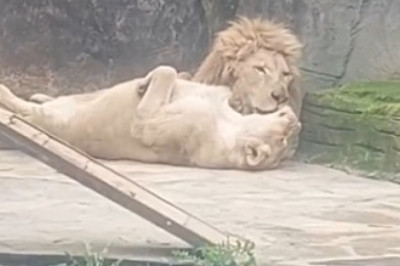
views

Pedigree Pets: Weighing the Promise and Pitfalls of Purebred Companions
In an age where social media trends and lifestyle branding influence everything from fashion to food, pet ownership is no exception. Pedigree pets—those with certified lineage and breed documentation—have surged in popularity, often seen as status symbols or ideal companions tailored to specific lifestyles. But beneath the allure of predictability and prestige lies a complex web of considerations that every prospective pet owner should explore before committing to a purebred animal.
Angela Hickey, an in-house vet and qualified psychotherapist at Allianz, offers a comprehensive guide to help pet lovers navigate the decision-making process. Her insights delve into the practical, emotional, and ethical dimensions of choosing a pedigree pet, shedding light on both the benefits and the challenges that come with this choice.
What Does “Pedigree” Really Mean?
At its core, a pedigree pet is one whose ancestry is documented and certified by recognized organizations such as the Irish Kennel Club (IKC) or the Governing Council of the Cat Fancy of Ireland (GCCFI). These certificates trace a pet’s lineage across at least three generations, confirming its breed purity and eligibility for activities like showing or breeding.
This level of documentation offers a sense of predictability. Owners can anticipate the pet’s size, temperament, grooming needs, and even potential health risks. For those seeking a companion that fits neatly into a specific lifestyle—whether it’s a high-energy dog for outdoor adventures or a calm lap cat for quiet evenings—a pedigree pet can offer clarity and confidence.
Questions to Ask Before Choosing a Pedigree Pet
Hickey emphasizes the importance of self-reflection before making a decision. Prospective owners should consider:
-
Lifestyle and family setup: Do you have children or plan to in the future? Some breeds are more tolerant and sociable than others.
-
Desired traits: Are you looking for a pet that’s active, affectionate, protective, or low-maintenance?
-
Time commitment: How much time can you realistically dedicate to training, grooming, and exercise?
-
Financial investment: Beyond the purchase price, pedigree pets often come with higher costs for food, veterinary care, insurance, and equipment.
These questions help ensure that the chosen breed aligns with the owner’s daily life and long-term expectations.
The Advantages of Pedigree Pets
One of the most compelling reasons to choose a pedigree pet is predictability. With defined characteristics and breed standards, owners can research and prepare for the pet’s needs in advance. This is particularly useful for families with specific requirements, such as hypoallergenic coats or gentle temperaments.
Pedigree pets also offer opportunities for breeding and showing. Owners interested in participating in breed competitions or producing litters can benefit from the pet’s eligibility and documented lineage.
Another advantage is health transparency. Responsible breeders provide detailed health histories of the pet’s parents, including DNA tests and screening results. This allows owners to anticipate and manage potential genetic conditions, reducing the risk of unexpected medical issues.
Finally, temperament and behavior are more predictable in pedigree pets. Meeting the pet’s parents and observing their environment can offer valuable insights into the animal’s socialization and personality. Breeders often provide guidance on continuing behavioral development, helping owners avoid future problems.
The Disadvantages and Ethical Considerations
Despite their appeal, pedigree pets come with notable drawbacks. One of the most pressing concerns is adoption ethics. While pedigree animals are bred for specific traits, countless mixed-breed pets in shelters are in need of loving homes. Choosing a pedigree pet may inadvertently contribute to overpopulation and neglect in rescue facilities.
Cost is another significant factor. Pedigree pets are typically expensive to purchase, and their predisposition to genetic conditions can lead to high veterinary bills. Breeds like pugs, Persian cats, and French bulldogs are known for respiratory issues, while King Charles Spaniels may suffer from painful spinal conditions. German Shepherds are prone to hip dysplasia, a debilitating joint disorder.
These health challenges not only affect the pet’s quality of life but also cause emotional and financial strain for owners. Hickey warns that the most popular breeds are often the most genetically compromised due to overbreeding and selective trait enhancement.
Breeder integrity is a critical concern. The profitability of pedigree pets can attract unscrupulous breeders who prioritize profit over animal welfare. This can result in poor living conditions, inadequate socialization, and increased risk of inherited diseases. Hickey advises thorough research and consultation with organizations like the IKC, GCCFI, and breed clubs to identify reputable breeders.
Responsible Ownership and Breeding Practices
To mitigate these risks, Hickey recommends several best practices:
-
Visit the breeder’s facility: Observe the environment and meet the pet’s parents.
-
Request health documentation: Ensure the breeder provides a contract detailing health screenings and socialization history.
-
Consider rehoming options: Some pedigree pets are available through rescue groups or pounds, offering a more ethical alternative to commercial breeding.
-
Use trusted resources: Platforms like Dog Breed Health University and Federation for Animal Welfare offer valuable guidance on breed-specific care and responsible ownership.
These steps help ensure that the pet is healthy, well-socialized, and ethically sourced.
The Bigger Picture: Pedigree Pets and Society
The decision to choose a pedigree pet reflects broader societal trends. Social media has amplified the visibility of certain breeds, turning them into viral sensations and lifestyle accessories. This has fueled demand for specific traits—like the flat faces of French bulldogs or the luxurious coats of Persian cats—without adequate consideration of the health and welfare implications.
Hickey urges prospective owners to look beyond aesthetics and consider the long-term impact of their choices. “Before you pay out a good bit of money on a pedigree pet,” she writes, “make sure to research the breed well in advance and be aware of the genetic problems that may affect them.”
This message resonates in a world where pet ownership is increasingly intertwined with identity, branding, and social responsibility. Choosing a pet is not just a personal decision—it’s a reflection of values, priorities, and awareness.




















Comments
0 comment